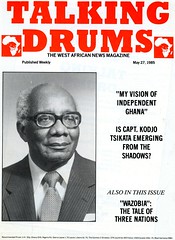Comment
Ask The People
Flight-Lieutenant Jerry Rawlings, Chairman of the Provisional National Defence Council (PNDC) used the occasion of an interview with Radio France Internationale and ex-captain Kodjo Tsikata, the Special Adviser, popularly perceived as the second most powerful person in the regime made his views known in an address to workers at a May Day parade in Accra.
Before these two speeches were made, Mr Justice D F Annan, member of the PNDC, official deputy to Flt-Lt Rawlings and the man appointed to "collate views from the public" about the form of government that will be eventually adopted by the country had been speaking about what he saw as the role of the National Commission on Democracy which he heads.
One unmistakable impression emerges from the various talks made by these three. The appointment of the National Commission to collate views from the public is a fraudulent step meant only to confuse people and win Brownie points from gullible foreign governments who have demanded a return to representative government as a condition for the financial help they are giving.
Mr Justice D F Annan and his National Commission on Democracy are enacting a charade of gigantic proportions. It is quite obvious that as far as the authorities are concerned, the views of the people of the country count for nothing, the authorities have already made up their minds on what Justice Annan should produce. They have decided what is right for the country and in case anybody is under any illusions whatsoever, they have made it clear that they are not going to be swayed by other views even if they should happen to come from the majority.
For the avoidance of all doubts, Captain Tsikata wanted it understood that they have not appointed the National Commission for Democracy to preside over a return of the country to a system that has failed the country. He then proceeded to pour scorn on the various governments especially the civilian ones that existed in Ghana, detailing their failures and weaknesses.
The suggestion that because mistakes were made by certain governments means that the systems they tried to operate were unsuitable or flawed is at the very least illogical. Within the past three and a half years in Ghana a number of quite radical alternatives have been tried as antidotes to some of the ills that the December 31 1981 coup d'etat was supposed to cure.
The most fundamental probably is the concept of involving all the people in the "decision making process". In pursuit of this, Peoples Defence Committees and Workers Defence Committees were formed and the country was told that this was the only system that will guarantee the rights of the ordinary people. Even the most ardent supporter of the PNDC will allow that the PDCs and WDCS have been less than a success. It is doubtful that Flt-Lt Rawlings now believes that the PDC/WDC system of Government is unsuitable because it has now been tried and shown to have failed abysmally in spite of all the support given it by the PNDC.
In much the same way, the Tribunals were introduced as an answer to all that was perceived as the failings of the old judiciary Flt-Lt Rawlings himself gave the Tribunals all his support, saying that the old system did not dispense justice and was heavily weighed against the poor of the society. In less than three years, it has been discovered that Tribunal Chairmen and panel members can be and have been scandalously corrupt. Flt-Lt Rawlings himself has even had to intervene personally to get Tribunal decisions reversed and sentences altered. It is doubtful that Flt-Lt Rawlings will accept therefore that the Tribunal system is unsuitable for the country.
What Ghana has needed is a strengthening of the institutions that should ensure that the various arms of government operate according to the rules; instead of the never ending search for new systems that are supposedly suited for the country's peculiar needs.
The problem of corruption will necessarily come to the fore in any such discussion. Exhortations and launching of special operations have not stemmed and not even the threat of execution has stopped corruption. But then, cor- ruption has flourished because so much of governmental activity is shrouded in secrecy especially in the present "people's government". If the award of every contract that will be financed from public funds is published and the particulars of the recipients are all published, much of the corruption will doubtless cease. Crime flourishes in secrecy and even a divinely inspired system of govern- ment will fail unless it is operated openly and information is available to the public for scrutiny and discussion.
Oppression flourishes when officialdom is assured that government actions will not be exposed to the public. The security services break the law when they know their actions will remain in the realm of rumour and speculations. The courts cease to dispense justice and are influenced by personal and other considerations when they know they are shielded from public scrutiny.
The temptation is very great for leaders to imagine that because they are themselves so convinced of the righteousness of their actions, the people should accept them. That conviction becomes unacceptable arrogance when they decide that the will of the people does not matter and they try to impose themselves.
Unfortunately, history is not on the side of Fit-Lt Rawlings and his friends. He might not think very much of the intelligence of the people over whom he rules, but since it is impossible that he will be around at all times to ensure justice, he should ask the people themselves what they want.
